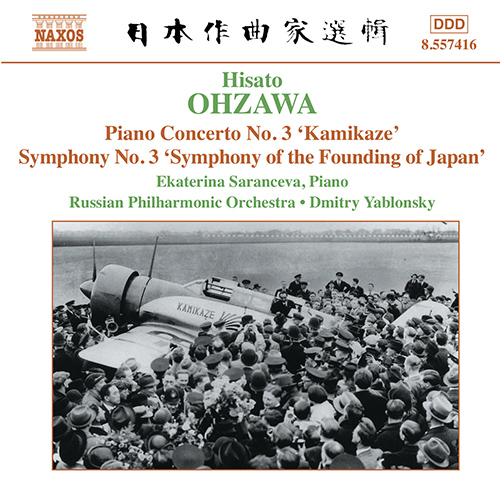OHZAWA: Piano Concerto No. 3, 'Kamikaze' / Symphony No. 3
Hisato Ohzawa, one of the foremost Japanese composers of the first half of the twentieth century, studied in the 1930s in Boston and Paris. He had an excellent command of diverse styles derived from his extensive knowledge of jazz, late Romanticism, Debussy, Ravel, Bartók, Hindemith and other contemporary composers. The Piano Concerto No. 3 ‘Kamikaze’ (a Japanese-made civil aircraft of that time, which set a new record for the shortest flight from Tokyo to London in 1937) shares something of the motoric dynamism of Honegger and Prokofiev. Symphony No. 3, written in 1937 to celebrate the 2600th Anniversary of the Founding of Japan, leans towards late Romanticism, Myaskovsky and Roussel.
Ekaterina Saranceva was born in 1962 and began her musical studies at the age of five at the Central Musical School in Moscow. After she graduated from music school she entered the the class of Professor V. Kastelsky at the Moscow State Conservatoire. At the Montreal International Piano Competition in 1984, there were 52 participants from nineteen different countries, but Ekaterina Saranceva, who demonstrated strong will and persistence, an outstanding talent, confident technique and a rich variety of sound, was unanimously chosen as the winner of the Grand Prix. In 1984 the pianist was also awarded the Grand Prix at the International Competition of radio recordings, “The Tribune of Young Performers”, in Bratislava. Ekaterina Saranceva tours Russia and other countries including Canada, Bulgaria and the United States.
The Russian Philharmonic Orchestra is firmly rooted in Russia’s rich musical traditions, and has achieved an impressive and outstanding musical quality by drawing its musicians from the highest ranks of Russia’s most famous orchestras such as the Moscow Radio Symphony Orchestra, the Russian National Orchestra and the State Symphony Orchestra. The Russian Philharmonic Orchestra was originally formed as a recording ensemble and has gone on to receive high acclaim also for its concert performances. In addition to regular recordings for leading international companies, the orchestra has also undertaken tours to Turkey, Austria, Germany, China, Taiwan, Finland and elsewhere. Dmitry Yablonsky was appointed music advisor to the orchestra in 2003. In 2006 the orchestra won a Gramophone prize for their recording of Shostakovich on Deutsche Grammophon.

Born in Moscow, GRAMMY Award-nominated cellist and conductor Dmitry Yablonsky’s career has taken him to Carnegie Hall, Teatro alla Scala and Théâtre Mogador, among other such celebrated venues.
As a conductor he has worked with the Royal Philharmonic Orchestra, Moscow Philharmonic Orchestra, Orquesta Filarmónica de la UNAM, Mexico, and the Israel Philharmonic Orchestra.
In 2010 he received the Diploma of Honorary Academician at the Independent Academy of Liberal Arts at the Russian Academy of Sciences.
He has transcribed and edited works for cello which have been published by the International Music Company and Dover Publications. In 2008 Naxos released his recording of Popper’s Forty Études for solo cello (8.557718–19) to critical acclaim.
He is a professor at the Buchmann-Mehta School of Music at Tel Aviv University and has served as artistic director of the Wandering Stars Music Festival in Israel since 2019. Yablonsky is currently music director of Kyiv Virtuosi. He plays two cellos, a Joseph Guarnerius, filius Andrea and a Matteo Goffriller.
The Japanese composer Hisato Ohzawa studied in the 1930s in Boston and Paris under Converse, Sessions, Schoenberg, Dukas and Nadia Boulanger, and conducted performances of his own works with the Boston Symphony and Pasdeloup orchestras. With an extensive knowledge of late Romanticism, contemporary composers and jazz, he had a good command of diverse styles, but he found contemporary conditions in Japan more limiting. His independence led him to turn to music that met the needs of his time, during and after the war. There has been wide neglect of his work since his sudden death in 1953.
Orchestral Music
The third of Ohzawa’s piano concertos, Kamikaze, refers in its title to a Japanese-made civil aircraft of that time, which set a new record of the shortest flight from Tokyo to London in 1937. The concept of the work is similar to that of the machinery-oriented music by Honegger, Prokofiev and Ohzawa’s teacher Converse. His Symphony No. 3, completed in 1938 to celebrate the 2,600th anniversary in 1940 of the founding of Japan, was one of a number of works commissioned for the same occasion. Ohzawa’s symphony sought to ally his own musical position with his own country. The work is massive in its conception, reflecting something of the patriotic feeling of Soviet music of the period.
































